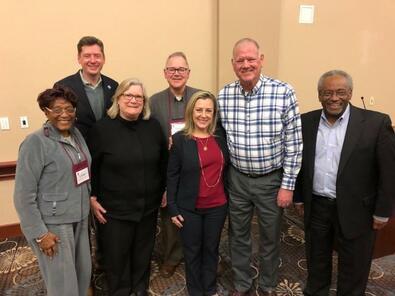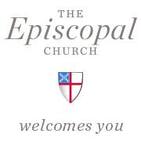 (l-r) Deputy Lillian Davis-Wilson of Western New York, Oklahoma City Mayor David Holt, President Jennings, General Convention Executive Officer Michael Barlowe, Congresswoman Horn, Bishop Ed Konieczny, Presiding Bishop Michael Curry (l-r) Deputy Lillian Davis-Wilson of Western New York, Oklahoma City Mayor David Holt, President Jennings, General Convention Executive Officer Michael Barlowe, Congresswoman Horn, Bishop Ed Konieczny, Presiding Bishop Michael Curry The winter meeting of the Executive Council was held at the Sheraton Midwest City Hotel and Reed Conference Center, OK. Presiding Bishop Michael B. Curry opened his remarks around his experience the prior week when visiting the City Mayor David Holt, President Jennings, General Convention Executive Officer Michael Barlowe, Congresswoman Horn, Bishop Ed Konieczny, Presiding Bishop Michael Curry Anglican Church of Southern Africa. A young Anglican asked him if there was a future for the church. As he pondered the question, he thought “does the church, the community of people who have faith in Jesus, have a future? That may be one of the most critical questions before us in our time.” He continued, “The question applies to all faith communities, not just Episcopal ones, or even solely Christian ones.” In answering the question, he said, "Faith does not have a future if faith and religion is seen and understood as an institutional arrangement. Faith will not have a future if we believe that the church is an institution that we must prop up to keep it going,” He reminded us that the Christian church has been an institution periodically; it began as a "Jesus Movement,” and later became an institution that crowned emperors, only to be divided by theological schisms and reformations. The church has moved from the established churches of the majority to “a fragile minority.” He said that the way of love exemplified by Jesus is not just the way of love for the world, but can be the way of life for the church. “If we cannot witness to that way of love, then we ought to die because we have nothing to give the world.” The Presiding Bishop insisted that we listen to what the spirit is saying to our church. He inspired us to pray, to “find our life following Jesus' way of love, then the gates of hell will not prevail against us.” President of the House of Deputies, the Rev. Gay Clark Jennings devoted her opening remarks to Archbishop of Canterbury Justin Welby's decision not to invite same-sex spouses to the 2020 Lambeth Conference of Bishops. She said, “If the communion is not able to hold a global meeting of Anglican bishops and spouses to which everyone is invited, then I think we should not be holding global meetings of Anglican bishops and spouses." Jennings continued that Archbishop Idowu-Fearon’s post promulgated “a misconception about the Anglican Communion’s governance” by claiming that the Anglican Communion’s position on marriage is defined by Resolution I.10 of the 1998 Lambeth Conference. She said that only the Anglican Consultitaive Council – ACC- is seen as the corporate entity of the Anglican Communion by the instruments’ governing documents and British law. Setting policy is only the ACC’s job. She also noted that the resolution’s reference to marriage as a “lifelong union” seems not to pertain to the opposite-sex spouses of bishops who have been divorced and remarried but are still invited to Lambeth. “We are left to conclude that excluding same-sex spouses is a selective decision.” Jennings suggested that, if the communion cannot resolve to invite all of the bishops’ spouses, “I think that the day is coming when we will need to take a hard look at where and how we invest the resources of The Episcopal Church across the Anglican Communion.” She cautioned that her stance “is not at all the same thing as saying that we should not be in relationship with the Anglican Communion.” She said her travels across the communion have seen the communion as life-giving, life-saving, mutual relationships rooted in dioceses, congregations and networks across the world. “That is the Anglican Communion that deserves our energy and attention, our commitment and our resources,” she said. Archbishop Welby’s refusal currently affects two bishops and one bishop-elect in the Anglican Communion. She stated, "One of the couples is the parents of two young children. I cannot overlook the fact that the Anglican Communion Office has created a public situation in which two children are learning that the hierarchy of the church considers their family to be a source of shame and worthy of exclusion. When little children are collateral damage, that is not the way of love.” Executive Council heard a report from Treasurer Kurt Barnes that showed the church ended the 2016-2018 triennium with between $5 and $6 million more in income than it had in expenses, due in large part to the startup of some programs delayed to the current triennium. The Domestic and Foreign Missionary Society’s investment portfolio was down just more than six percent in 2018, Barnes reported the portfolio recovered six percent in January. “We just hope and pray that it continues for the remainder of this year.” Barnes also said the sale of a city block in Austin, TX, which had been hoped would be the site of a new Archives of the Episcopal Church, netted $19million after paying off the debt on the land. After the opening plenary we spent the rest of the day meeting in committees until the afternoon of Feb. 22 when we visited the Oklahoma City National Memorial and Museum. The memorial and museum commemorates the April 19, 1995, bombing of the Alfred P. Murrah Federal Building by Timothy McVeigh, an act of domestic terrorism that killed 168 people and injured 600 others. Saturday, Feb. 23, we returned to the plenary session. Committees began their reports to the full body, As vice-chair on Mission Beyond the Episcopal Church, we proposed three resolutions: MB002: Approved the presiding bishop's and president of the House of Deputies appointments of the Rev. Ted Thompson and the Rev. Alfred E. Moss to the interreligious convening Table of the National Council of Churches; MB003: Expressing gratitude for the continuing dialogue with the United Methodist Church as they meet in a Special Session of the General Conference, Feb. 23-26 in St. Louis, MO; MB004: Expressing "deepest concern regarding the humanitarian and political crisis affecting Venezuela and sends greetings to our brothers and sisters in the Diocese of Venezuela. All resolutions were approved by the full body. We traveled to St. Paul’s Episcopal Cathedral in Oklahoma City for Eucharist Sunday morning, Feb. 24. The Presiding Bishop gave the sermon, telling us to overcome evil with good, that we should never avenge ourselves that vengeance is the way of the Lord. We heard several stories on love, the love of humanity and the constitution, loving thy neighbor as ourselves, not listening to gossip and people putting others down around the water coolers in the office. But the best story for me was when the Presiding Bishop related to losing one’s religion in traffic when someone cuts in front of you and you roll down your window and proceed to speak in sign language. He said, “Hold fast for what is good, don't let evil overcome good, but overcome evil with good and put up two fingers giving the sign of peace.” I left the cathedral remembering three loves: love God, love your neighbor and don't forget to love yourself. We concluded our meeting Sunday afternoon unanimously approving the resolution GO006, "Exclusion of spouses at Lambeth Conference: When does all mean all?” The resolution says, “it finds the decision “inconsistent” with the positions of The Episcopal Church and with multiple statements of Anglican Communion entities that have urged the church to listen to the experiences LGBTQ persons.” Presiding Bishop Michael Curry said in a statement after the vote that the resolution “reflects our commitment to be ‘a house of prayer for all people, as the Bible says, where all are truly welcome.” The words of the Apostle Paul to the Galatians should be true for the church today: “All who have been baptized into Christ have put on Christ. There is no longer Jew or Gentile, slave or free, male or female, for all are one in Christ." Respectfully submitted by, The Rev. Lillian J. Davis-Wilson Comments are closed.
|
Archives
July 2024
Categories |

 RSS Feed
RSS Feed



